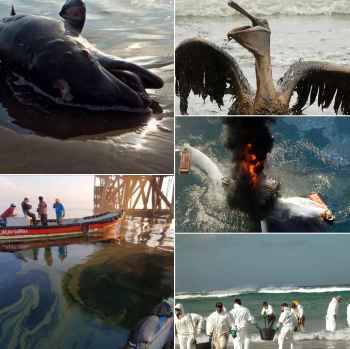|

Photo: Facebook/AME
The price of oil
 PERU
PERU
Saturday, June 15, 2024, 21:00 (GMT + 9)
Fishing and aquaculture for human consumption, those invisible arts to feed the world, have suffered for centuries in our country from enormous neglect by official entities, which keep them relegated, marginalized and even stigmatized due to a State incapable of realizing that they are vital. for food security, the economy, environmental sustainability and cultural identity of Peru.
There has been talk about the need to promote the energy development of our country, that we must facilitate investments in hydrocarbons and support their establishment in our jurisdictional sea.
The Anadarko company has confirmed that the oil potential of blocks Z61, Z62 and Z63, located in the Trujillo Basin, would allow the extraction of 200,000 barrels of crude oil per day. The Australian Cóndor Energy points out that there are great oil possibilities in new areas of the Pacific in front of Tumbes. Some sycophants and sycophants from different hydrocarbon exploitation companies even point out that Norway's prodigious development is largely based on its extraction of black gold in the maritime sphere and that they have been drivers of the aquaculture boom in that country.
.png) They forget that Norway undertook a venture in this area with the fundamental premise that it would have to be guaranteed first of all, that no activity would be affected and that the benefits that the State would receive would serve to boost other sectors of the economy, which happened. in practice. None of this happened in Peru, where we have encountered innumerable effects on fishing and mariculture, without the State making the slightest effort to avoid or mitigate them. For this reason, the decided refusal of the coastal communities that are frontally opposed to these initiatives, as occurred in 2018, when the Vizcarra government was forced to repeal the Supreme Decrees that approved oil exploration and exploitation on the coasts of Lambayeque and Freedom.
Few know that the Ministry of Energy and Mines recognizes that there are 3,264 hydrocarbon environmental liabilities with latent risks to the health, safety of the population and the ecosystem, which demonstrate the historical inability of the state to adequately govern this industry on land and, even worse, , in the ocean. Will the public sector, which is not capable of guaranteeing the operation of our first air terminal, be able to assure us that the thousands of sea wells will not constitute a permanent threat to fishermen? In the height of ignorance, PerúPetro affirms that the tasks with artisanal vessels are only carried out within 5 miles, unaware that they are carried out up to 200 miles from Peru. All this makes us reaffirm our position on the current environmental and social unfeasibility of oil operations in the Mar de Grau.
The government would do well to understand that fishermen, those anonymous guardians of the seas, heroes without a medal, ignored by the State that unjustly turns them into the missing link in the food chain, could be completely ruined if a new hydrocarbon spill affected their work space. Today they are right in the fight to defend the ocean where life is born, a concern that is shared between Tumbes and Tacna. Let us prefer social peace, let us monitor the State so that it guarantees citizen security, prevents Asian fishing vessels from preying on our squid and is capable of dealing with emergencies in a timely and satisfactory manner. Meanwhile, leave the sea and those who travel through it in search of daily sustenance in peace.
|
|



